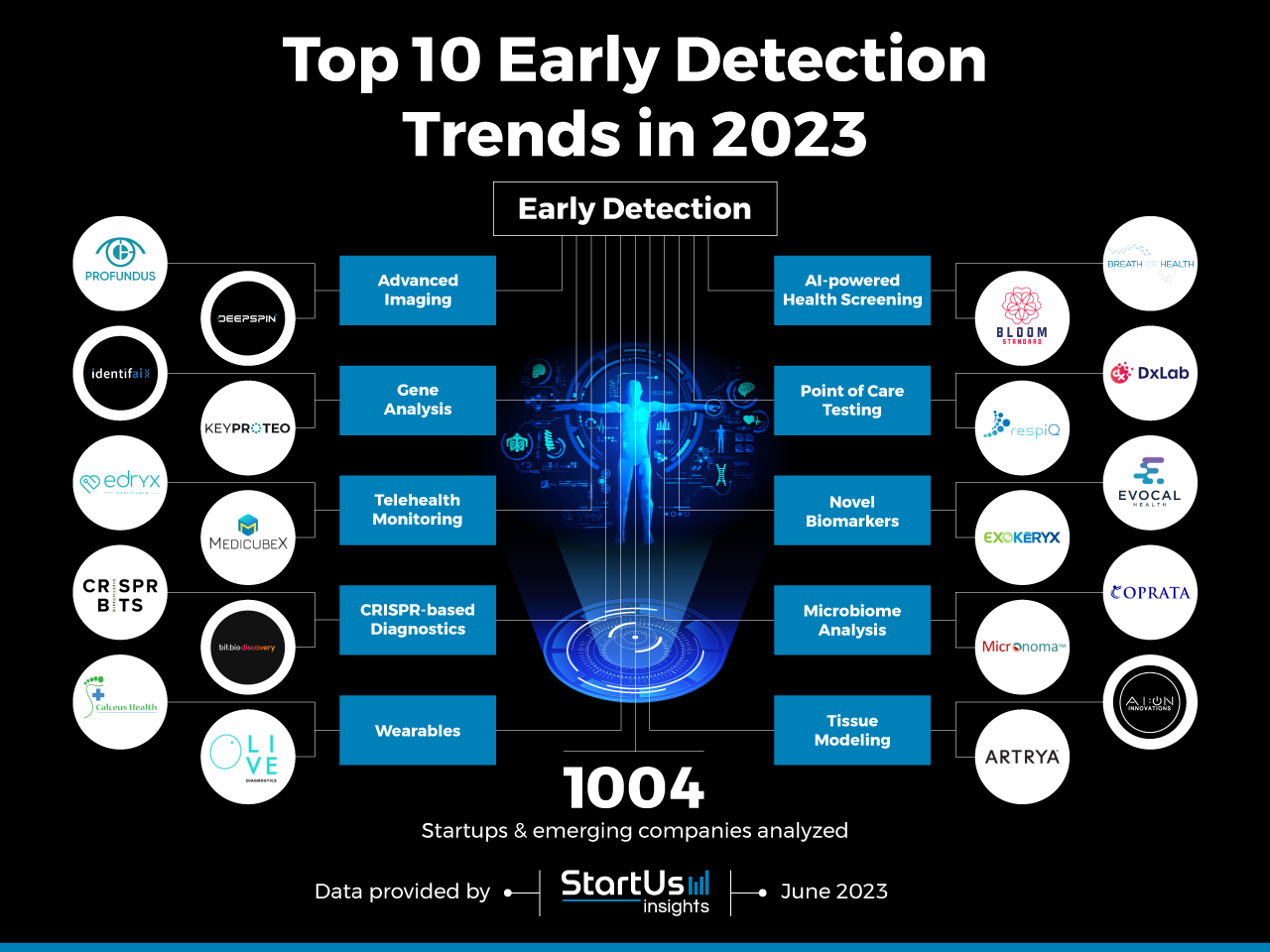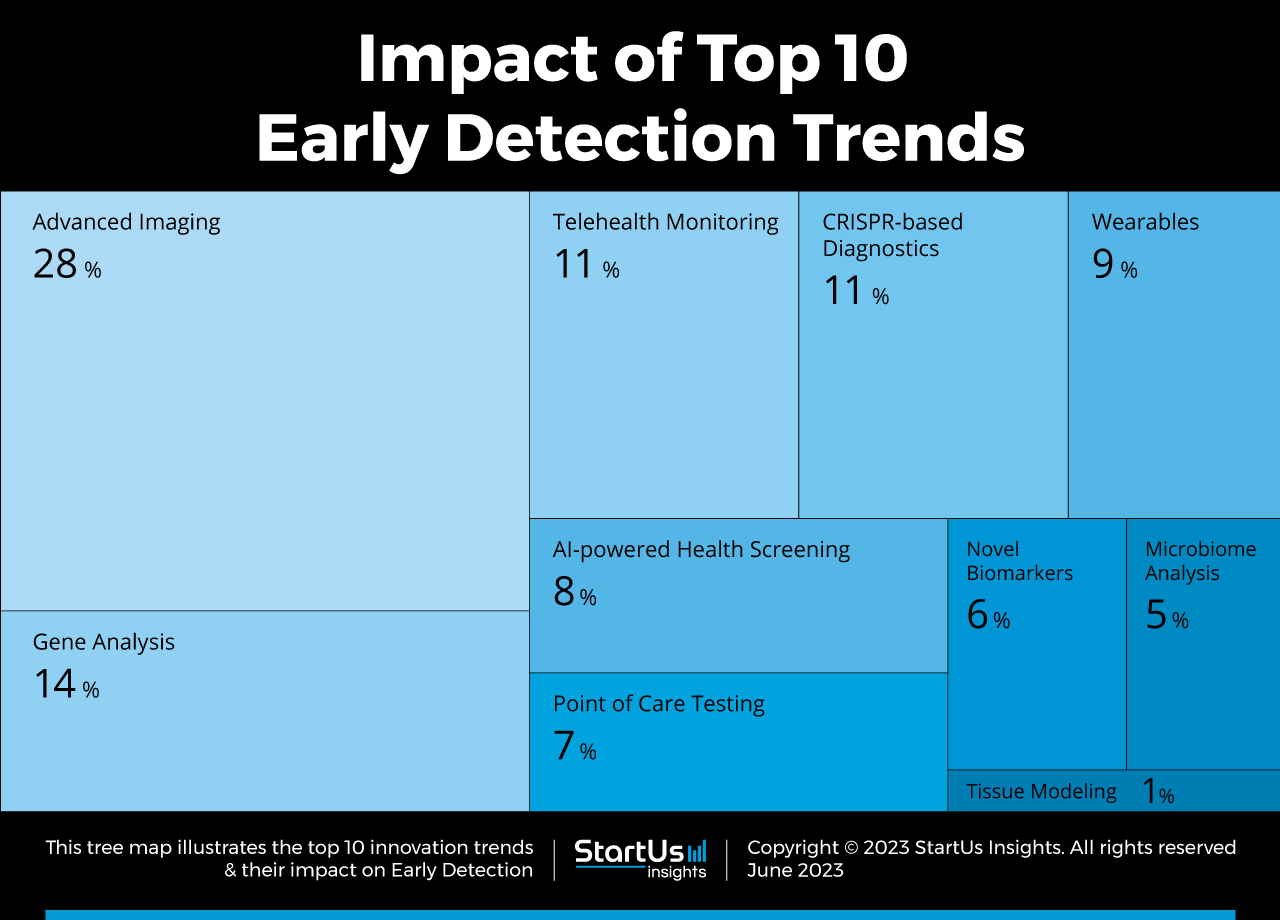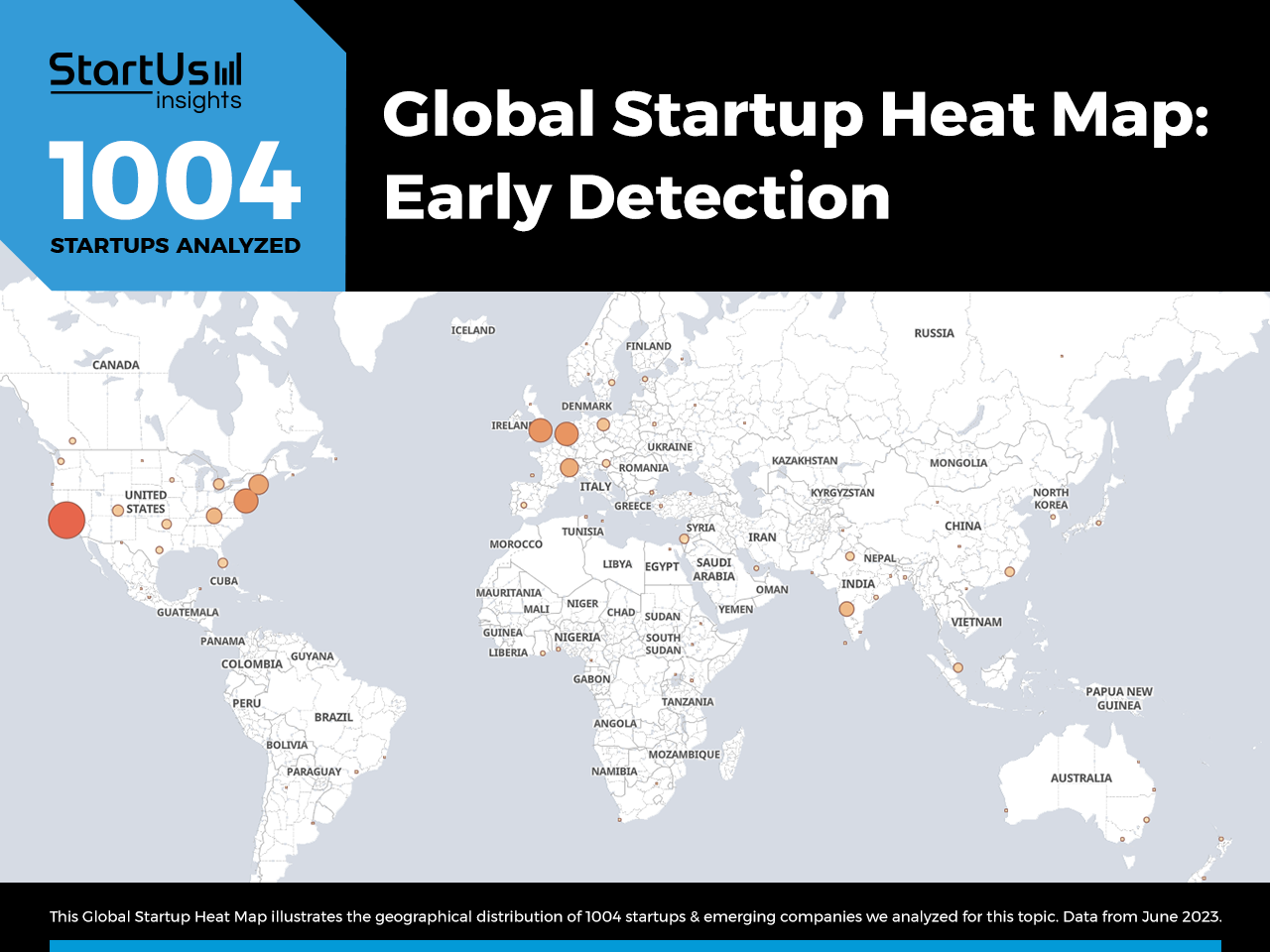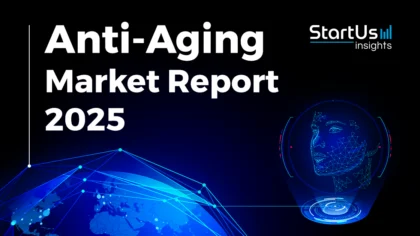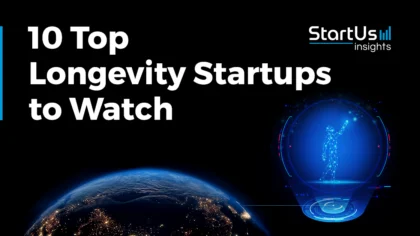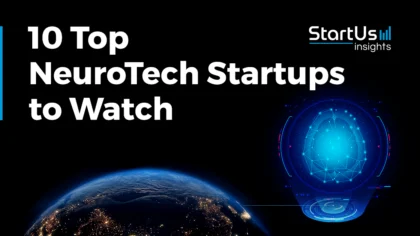Accelerate Productivity in 2025
Reignite Growth Despite the Global Slowdown
Early detection is a pivotal factor that significantly enhances outcomes and alleviates the burden of diseases. The timely identification of illnesses in their initial stages enables prompt intervention, personalized treatment plans, and comprehensive management. Nevertheless, the achievement of early detection is often impeded by various factors, such as limited healthcare accessibility, insufficient awareness, and the intricate nature of diagnostic procedures. Fortunately, cutting-edge technological advances are emerging as a solution to these challenges, revolutionizing patient care. This study focuses on a comprehensive analysis of 1,004 companies and highlights the top 10 early detection trends in 2023. These trends encompass a range of innovative approaches, including AI-powered screening algorithms, wearable devices, and telemedicine platforms, among others. By harnessing these groundbreaking technologies, individuals effectively monitor their health while healthcare professionals receive improved decision support.
Innovation Map outlines the Top 10 Early Detection Trends & 20 Promising Companies
For this in-depth research on the Top Early Detection Trends & Companies, we analyzed a sample of 1004 global startups & scaleups. This data-driven research provides innovation intelligence that helps you improve strategic decision-making by giving you an overview of emerging technologies in the healthcare industry. In the Innovation Map, you get a comprehensive overview of the early diagnostics trends & companies that impact your business.
These insights are derived by working with our Big Data & Artificial Intelligence-powered StartUs Insights Discovery Platform, covering 3 790 000+ startups & scaleups globally. As the world’s largest resource for data on emerging companies, the SaaS platform enables you to identify relevant technologies and industry trends quickly & exhaustively.
Tree Map reveals the Impact of the Top 10 Early Detection Trends
Based on the Early Detection Innovation Map, the Tree Map below illustrates the impact of the Top 10 Early Detection Trends in 2023. Advances in telehealth monitoring and wearables enable seamless remote tracking of health parameters and timely warnings. With this patient data, data analytics solutions enhance disease diagnostics. AI-powered health screening and advanced imaging solutions also streamline data analysis and treatment recommendations. Gene analysis and CRISPR-based diagnostic solutions target challenging diseases like cancer at a molecular level. Further, advanced biomarkers utilize indicators like voice to detect potential health issues and point-of-care testing (POCT) ensures rapid and accurate diagnostics. Lastly, tissue modeling aids professionals in visualizing disease progression and effects while microbiome analysis simplifies tissue anomaly detection.
Top 10 Early Detection Trends in 2023
- Advanced Imaging
- Gene Analysis
- Telehealth Monitoring
- CRISPR-based Diagnostics
- Wearables
- AI-powered Health Screening
- Point of Care Testing
- Novel Biomarkers
- Microbiome Analysis
- Tissue Modeling
Global Startup Heat Map covers 1004 Early Detection Startups & Scaleups
The Global Startup Heat Map below highlights the global distribution of the 1004 exemplary startups & scaleups that we analyzed for this research. Created through the StartUs Insights Discovery Platform, the Heat Map reveals high startup activity in West Coast US, followed by Western Europe. Below, you get to meet 20 out of these 1004 promising startups & scaleups as well as the solutions they develop. These early detection startups are hand-picked based on criteria such as founding year, location, funding raised, & more. Depending on your specific needs, your top picks might look entirely different.
Top 10 Early Detection Trends in 2023
1. Advanced Imaging
Conventional imaging methods often do not have the sensitivity or resolution to detect early-stage abnormalities. This makes it difficult to identify and diagnose conditions at their earliest and most treatable stages. Therefore, advanced imaging techniques, such as high-resolution magnetic resonance imaging (MRI), molecular imaging, and functional imaging, offer enhanced sensitivity and specificity. Consequently, they allow for the detection of subtle tissue changes, biochemical markers, and functional alterations. These advanced imaging modalities reveal early signs of diseases, enable more precise localization of abnormalities, and provide valuable insights into disease progression. By utilizing advanced imaging technologies, healthcare professionals are able to ensure more accurate diagnoses.
Profundus Imaging advances Retinal Imaging
Profundus Imaging is a Swedish startup that uses adaptive optics for advanced retinal imaging. The startup’s Guide Star System offers up to higher resolution than conventional retinal imaging instruments and enhanced corrected imaging area than competing concepts. This technology allows for the visualization of retinal microstructures and structural changes induced by retinal disease on a cellular level over a clinically useful imaging area. Profundus Imaging addresses preventable vision impairments by offering quick and easy imaging of the macula, the central part of the retina related to sharp vision.
DeepSpin creates a Portable MRI Machine
DeepSpin is a German startup that develops an AI-powered MRI system that is portable, affordable, and easy to use. It is significantly lighter than traditional MRI machines and is easily movable, which enables the transport of MRIs directly to the patient. The MRI is also significantly more economical while retaining high image quality and does not need additional infrastructure for adjustment, maintenance, or cooling. The startup thus democratizes MRI machines making them accessible to everyone, regardless of resources. This improves the standard of care in medical domains and enables better access to MRI in developing countries.
2. Gene Analysis
Many diseases have a genetic component, but identifying the specific genes involved and their impact on disease risk is highly complex. Advances in genetic analysis techniques, such as genome sequencing and gene expression profiling, allow researchers to study the genetic variations and gene expression patterns associated with various diseases. By analyzing a patient’s genetic information, healthcare professionals identify genetic markers or mutations that increase the risk of diseases. This knowledge enables early detection by identifying individuals who may be predisposed to developing specific conditions. Gene analysis also contributes to precision medicine approaches by guiding targeted interventions and personalized treatment plans based on unique genetic profiles.
Identifai Genetics offers Non-Invasive Prenatal Analysis
Identifai Genetics is an Israeli startup that advances prenatal testing with bioinformatics. Its solution involves isolating, examining, and analyzing fetal cell-free DNA from a simple maternal blood test. The startup’s proprietary data science algorithms provide a comprehensive perspective of the fetus’s health at an early stage of pregnancy. Identifai’s technology provides early, non-invasive, and comprehensive prenatal genetic testing, from point mutations to chromosomal anomalies.
Key Proteo provides Novel Peptide Screening for Newborns
Key Proteo is a US-based startup that specializes in novel peptide screening for newborn babies. The startup’s newborn screening and diagnostic tests detect low-abundance proteins from a few drops of blood. The solution provides preemptive treatment for genetic diseases before they manifest clinically. Key Proteo’s projects include newborn screening, immune-plex screening, and lysosomal storage disorders (LSD) screening. These aim to provide comprehensive and non-invasive screening for a variety of genetic disorders.
3. Telehealth Monitoring
Patients in remote and overcrowded regions face a wide range of problems including the lack of access to healthcare services and the need for continuous dedicated monitoring. Telehealth monitoring solves these problems through remote patient health monitoring using connected devices and technology. By using telehealth platforms, healthcare providers remotely monitor blood pressure, heart rate, blood glucose levels, and more. This continuous monitoring allows for early detection of abnormalities or changes in health indicators, ensuring prompt intervention and care. Patients are also able to transmit their health data to medical professionals for analysis and receive feedback or instructions remotely. Telehealth monitoring thus provides a proactive approach to healthcare, reducing the need for in-person visits and enabling real-time tracking of health conditions.
Edryx Healthcare creates Chatbots to Detect Diseases
Spanish startup Edryx Healthcare focuses on enhancing healthcare humanization and digitization through AI and telemedicine tools. The startup’s chatbot uses artificial intelligence to identify symptoms and risk factors in individuals with potential physiological disorders. The chatbot aids in the detection of diseases, facilitating treatment in early disease stages. The startup’s AI also analyzes healthcare processes and patient flows to detect bottlenecks and provide improvements to increase the quality received and perceived by patients. Edryx thus provides the healthcare and medical industries with the tools to ease the prevention and early detection of various pathologies.
MedicubeX develops eHealth Stations
Finnish startup MedicubeX prevents cardiovascular diseases and diabetes by creating autonomous self-measurement and telehealth kiosks. The startup’s ehealth station features medical check-ups for early detection of risk factors and diseases, automation of patient workflow, and a telehealth solution. MedicubeX’s technology also includes UV-C disinfection against bacteria and viruses as well as enables remote doctor appointments. The implementation of MedicubeX’s solution in hospitals and medical centers streamlines operations and automates patient flow. The startup’s solution creates high-performing, patient-centric smart hospitals.
4. CRISPR-based Diagnostics
Most traditional diagnostic tests lack the sensitivity and specificity to detect diseases at early stages and often compromise on accuracy or speed. Therefore, startups are developing CRISPR-based diagnostics that leverage the precision of CRISPR-Cas enzymes to target and cleave disease-specific genetic sequences. In combination with signal amplification techniques, such as fluorescent or colorimetric reporters, CRISPR-based diagnostics solutions enable the visual detection of disease-related genetic markers. These early diagnostics offer rapid, cost-effective, and highly accurate results to ensure timely intervention. CRISPR-based diagnostics hold immense potential for detecting infectious diseases, genetic disorders, and even cancer at their nascent stages.
CrisprBits provides Pervasive Diagnostics
CrisprBits is an Indian startup that leverages CRISPR technology to precisely locate and edit DNA. The startup develops a comprehensive testing system to address the threat of hospital-acquired infections and antimicrobial-resistant pathogens. Its product, PathCrisp, identifies infectious pathogens and antimicrobial resistance genes in intensive care units (ICUs). The system also combines CRISPR technology with machine learning to provide treatment recommendations. This point-of-care testing system balances the timely treatment of patients with the right choice of antibiotics.
Bit.bio Discovery offers CRISPR-based Perturbation Screening
Bit.bio Discovery is an Austrian startup that combines functional genomic screening and human cellular models. Its CRISPR perturbation screening platform enables the discovery and validation of novel drug targets or the elucidation of the mechanism of action of drugs. The platform uses large libraries of guide RNAs to perturb genes, creating a mixture of single-gene knockouts that investigate biological phenotypes. Bit.bio Discovery’s platform provides an expanding opportunity to perform CRISPR screens for drug discovery and validation.
5. Wearables
Traditional healthcare settings often rely on sporadic measurements taken during doctor visits, which may not capture the full picture of patient health status. This also increases the chance for misdiagnosed health conditions to prompt action only once the patient starts experiencing symptoms. Wearables, such as smartwatches and fitness trackers, continuously monitor vital signs, activity levels, sleep patterns, and more to mitigate misdiagnosis. These devices provide highly-relevant data that healthcare facilities analyze to identify patterns, trends, and early signs of potential health issues. By wearing these devices throughout the day, patients and healthcare professionals have access to a continuous stream of health information. This enables early detection of anomalies or changes in health parameters.
Calceus Health aids Foot Health Monitoring
Australian startup Calceus Health focuses on the early detection of diabetic foot ulcers using sensor technology and data analysis. Its product, Sensor Skins, is a smart sensor that measures the interaction of the foot with the sensor skin to send measurement readings directly to the wearers’ mobile device. The solution includes patented shear friction sensor technology as well as embedded friction, pressure, and temperature sensors. Calceus Health supports patients and health professionals in the early detection of diabetic foot ulcers and prevents diabetic lower-leg amputations.
Olive Diagnostics delivers Home-based Urinary Diagnostics
Israeli startup Olive Diagnostics makes a fully passive, non-invasive real-time urine analysis sensor that is installable on any toilet. The Olive KG device is a purpose-built, multi-frequency spectrometer that detects molecules in urine and provides continuous data collection every time a person urinates. Its cloud-based AI system calculates molecule concentrations, analyzes and tracks collected data, and alerts the wearer to any changes or anomalies. Additionally, it ensures that all user data is safe, secure, and private, adhering to HIPAA and GDPR compliance.

6. AI-powered Health Screening
The early detection of health conditions is highly challenging due to the complexity of symptoms and subtle patterns or indicators that signal the presence of diseases in their early stages. However, AI-powered health screening solutions analyze vast amounts of patient data, including electronic health records (EHRs), medical images, and genetic information. By applying machine learning and predictive modeling, AI systems screen and identify individuals who may be at a higher risk of developing certain health conditions. This enables healthcare providers to intervene proactively, initiate preventive measures, and deliver targeted screenings or interventions to those most likely to benefit. AI-powered health screening also improves resource allocation by prioritizing high-risk individuals for further evaluation and treatment.
Breath of Health advances Molecular Screening
Israeli startup Breath of Health offers cancer diagnostics using breath-based tests. The startup leverages AI for the real-time detection of a broad range of cancerous biomarkers. Its proprietary AI enables rapid breath sample analysis to improve patient outcomes through highly effective monitoring and analytics. The startup also offers non-invasive, accessible, and affordable screening programs for various diseases, including respiratory diseases, COVID-19, cancer, and neurodegenerative diseases. Breath of Health provides data on new targets based on correlative studies between breath samples and relevant biomarkers before treatment.
Bloom Standard provides Autonomous Ultrasound Scans
US-based startup Bloom Standard offers autonomous, hands-free ultrasound scans that detect heart or lung abnormalities. The startup’s AI-driven onboard image interpretation provides real-time decision support and timely referrals. It reduces mortality from delayed, missed diagnosis, or misdiagnosis and improves health access and equity for medically fragile children with lung and cardiac conditions.
7. Point of Care Testing
In healthcare, obtaining diagnostic results is a time-intensive process and significantly hinders early disease detection. Innovations in point-of-care tests provide immediate access to diagnostic information. This enables healthcare providers to make timely clinical decisions and initiate appropriate interventions. POCT thus eliminates the need for samples to be sent to centralized laboratories, reducing turnaround times and streamlining the diagnostic process. It also improves patient convenience as tests are performed in a single visit, avoiding the need for multiple appointments. By expediting the diagnostic process and enabling early detection, POCT solutions improve patient outcomes and optimize operational efficiency.
DxLab manufactures COVID-19 Tests
DxLab is a US-based startup that provides rapid and accurate diagnostic testing solutions, focusing on disease detection. Its FDA-authorized COVID-19 test features a tabletop device that provides accurate results in as little as 10 minutes. The device is compact, has a high throughput, and conducts up to eight tests in a random-access manner for quick turnaround. The process involves sample collection from a nasal swab, automatic testing by the instrument, and displaying results on the instrument screen. DxLab makes diagnostic testing portable, reduces guesswork with sensitive detection, and provides convenient on-site testing.
RespiQ creates a Breathalyzer
RespiQ is a Dutch startup that offers smart breath testing for personalized health management. The startup’s technology includes a non-invasive, AI-enhanced breathalyzer that provides real-time health monitoring for home and point-of-care use. It checks for biomarkers related to specific health issues like digestive discomfort and COPD. A proprietary algorithm then analyzes the data collected to provide personal health insights and early warnings of impending health issues. RespiQ empowers individuals to better manage their health and improve their overall well-being.
8. Novel Biomarkers
Biomarkers serve as measurable indicators within the body that provide information about the presence, progression, or severity of a disease or condition. By analyzing specific biomarkers, healthcare professionals detect the early signs of diseases, even before symptoms become apparent. This allows for timely intervention and treatment, leading to improved patient outcomes. Biomarkers also advance the development of personalized medicine as they identify individuals who are more likely to benefit from specific therapies or interventions.
EVOCAL Health discovers Vocal Biomarkers
German startup EVOCAL Health develops artificial intelligence for voice analysis to detect diseases. The startup’s device-agnostic platform collects, monitors, and analyzes patient voice data, seeking features within the human voice that correlate to various diseases. This technology provides precise information about a patient’s disease progression, aiding in decentralized clinical trials, remote monitoring, and patient self-management. EVOCAL Health’s focus areas include cardiovascular and cardiometabolic diseases, neurodegenerative and mental diseases, and respiratory diseases.
EXOKERYX innovates in Exosome-based Biomarker Discovery
US-based startup EXOKERYX advances early-stage disease and cancer diagnostics by combining solid-state electronics and exosome-based biomarker discovery. Its chip-based platform utilizes dipole moments of exosomes to isolate them and transistor technology to quantify and analyze them in biological fluids. The startup’s CancerFingerprint technology allows for early cancer detection and identifying other serious diseases with greater sensitivity. EXOKERYX thus extends the quality of life by avoiding harmful therapy pathways and focusing on early detection.
9. Microbiome Analysis
The human microbiome refers to the vast community of microorganisms that reside within the human body, influencing various aspects of our health. Deciphering the complex interactions between the microbiome and disease development is a challenging task. Through advanced sequencing technologies and computational analysis, researchers characterize the composition and functional potential of the microbiome. This analysis allows for the identification of specific microbial signatures associated with various diseases, providing potential early indicators. By examining the microbiome, healthcare professionals also gain insights into disease risk and progression as well as treatment response. Microbiome analysis thus paves the way for personalized interventions and preventive strategies.
Coprata creates a Smart Toilet
Coprata is a US-based startup that develops a smart toilet that collects key digestive health indicators, providing personalized and actionable feedback. It leverages multiple sensors and algorithms to analyze various metrics including stool consistency and color. The data flags abnormalities, monitor changes in bowel habits, and manage conditions like Crohn’s and Ulcerative Colitis. The toilet also supports automatic stool sampling for biochemical analysis, enabling the measurement of fecal biomarkers, non-invasive screening for colon cancer, and pathogen detection. Coprata’s solution enables individuals to take control of their digestive health and seek medical assistance at the earliest possible stage.
Micronoma ensures Early Cancer Detection
Micronoma is a US-based startup that specializes in cancer diagnostics using the microbiome to detect early-stage cancer. Its Oncobiota platform utilizes microbiome markers in tissue and liquid biopsies to detect cancer. The platform reveals cancer-related microbiomes with high specificity and sensitivity. Micronoma’s technology screens many cancer types, including lung cancer which has one of the highest incidences and mortality rates. Moreover, the startup’s solution significantly reduces the risk and cost of lung cancer diagnosis by lowering the rate of false positives associated with current detection methods.
10. Tissue Modeling
Current tissue-based diagnostics require invasive procedures, which are risky and inconvenient for patients. Additionally, tissue samples may not always be representative of the entire affected area, leading to sampling bias. Advances in tissue modeling overcome this by creating artificial tissue structures that mimic the properties and functions of real tissue. By studying tissue models, researchers gain insights into disease mechanisms, test the efficacy of potential treatments, and develop personalized approaches to healthcare. Moreover, tissue modeling eliminates the need for invasive procedures and provides a platform for studying diseases in a controlled environment. This simplifies early disease detection and health condition management.
AI:ON Innovations specializes in 3D Visualization
US-based startup AI:ON Innovations develops an AI system to highlight acute abnormalities in patient scans. The AI system detects lesions, tumors, and other abnormalities in their early stages, reducing the chance of missing critical health issues. AI:ON’s technology also predicts the growth of lesions over time and the response of breast cancer to chemotherapy. The startup’s solutions training dataset contains extensive data from a huge number of hospitals across many countries, with high average performance across accuracy, sensitivity, and specificity.
Artrya aids Artery Disease Visualization
Australian startup Artrya makes 3D modeling technology that allows physicians to quickly differentiate between benign chest pain and conditions requiring hospitalization and treatment. Artrya’s technology provides in-depth data on artery disease through non-invasive cardiac CT scans, eliminating the need for unnecessary invasive and low-value testing. By understanding the location, type, and extent of disease in coronary arteries, physicians prescribe preventative treatment or lifestyle modifications personalized to the patient, improving outcomes.
Discover all Early Detection Trends, Technologies & Startups
Advanced biomarkers, such as voice and other genetic parameters, enable the identification of previously unidentified or missed biological markers. Wearable devices are continuously providing more features and capturing richer health data, providing real-time insights into an individual’s health status and detecting abnormalities at an early stage. Advances in early disease detection and diagnosis technologies further enable personalized treatment plans. The Trends in Early Detection as well as the companies outlined in this report only scratch the surface of trends that we identified during our data-driven innovation & startup scouting process. Identifying new opportunities & emerging technologies to implement into your business goes a long way in gaining a competitive advantage.

